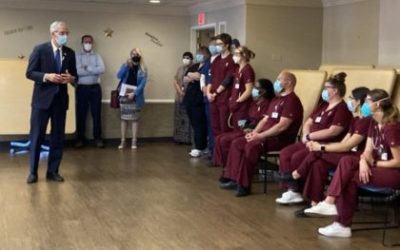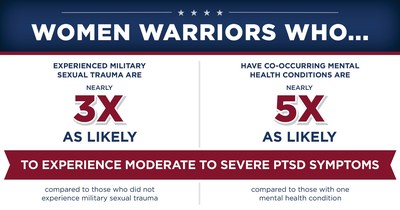Scientists from multiple military facilities made significant contributions to the 63rd American Society of Hematology (ASH) Annual Meeting here.
At the VA, the Biggest Challenge to Treating Blood Cancers Is Age
As the nation’s largest healthcare system, the VA treats more individuals with hematological malignancies than any other organization in the United States.
Dinardo Urges VA Physicians to Consider All Possibilities With Diagnoses
A clinician’s mind leaps to a diagnosis. It matches the symptoms; it wouldn’t be that unusual for a patient of that age; it seems the most likely solution to the answers that both veteran and physician are seeking.
OIG: VA Aware of Scheduling System Issues Before Second VAMC Rollout
VA knew of problems with its new scheduling system prior to its implementation at the Chalmers P. Wylie VA Ambulatory Care Center in Columbus, OH, and later at the Mann-Grandstaff VAMC in Spokane, WA, but failed to fix them before going live at the two facilities, according to a report released last month.
VHA Continues to Provide Too Many Low-Value Prostate Cancer Screening
Low-value healthcare is defined as practices or procedures without clear benefit or where potential harm outweighs the benefit. Deciding what is and isn’t low-value care can be especially difficult when it comes to cancer screenings; increasing age, greater illness burden or lower life expectancy—all weigh on decision-making.
VA Officials Face Hostile Legislators Complaining of Agency’s ‘Broken Culture’
VA has been criticized as suffering from a “broken culture” where employees do not feel comfortable coming forward about safety concerns, resulting in problems going unresolved and tragedies that could have been prevented.
How Solar Activity Impacts Blood Pressure in Older Adults
Hypertension is a known risk factor for cardiovascular disease, the leading cause of death in the United States.
Cytomegalovirus Linked to Airflow Limitation in Smokers
A common herpesvirus infection, cytomegalovirus can have a wide range of symptoms, from no symptoms to fever and fatigue to severe symptoms involving the eyes, brain or other internal organs. It is spread through sexual and nonsexual contact with body secretions.
What Causes Sleep Apnea in Injured Servicemembers?
Even though military servicemembers have few traditional risk factors for obstructive sleep apnea, the condition is prevalent in that cohort.
Early Reduced Airflow Can Predict Later COPD Diagnosis
Can identification of early airflow abnormalities predict future clinically important respiratory-related outcomes, including development of COPD?
Stimulants, Drug Mixes Play Increasing Role in Fatal Overdoses
Fatal drug overdoses have surpassed automobile accidents in recent years as the leading cause of accidental death and, despite efforts to reverse that trend, the number of overdoses is rising.
Sleep, Mental Health Surveys Useful for Seizure Patients
How useful are mental health and sleep screening questionnaires for patients admitted to a seizure monitoring unit?
Housing Insecure Veterans Much More Likely to Have Dementia
Veterans who are at risk of being homeless have significant greater risk of having Alzheimer’s disease and related dementias compared to other veterans.
Predicting MS Development After Optic Neuritis in Military
A new military study looked at how accurately a type of eye inflammation predicts later multiple sclerosis development.
Invasive Fungal Infection Remains a Serious Risk in Acute Myeloid Leukemia
Invasive fungal disease (IFD) is a highly morbid complication in patients with hematologic conditions including acute myeloid leukemia (AML), whose risk is increased due to both the disease itself and the treatments for it.
Survey: VA EHR Deployment Drove Down Staff Morale at Spokane VAMC
Despite lingering problems with the deployment of its new electronic medical record system at the Mann-Grandstaff VAMC in Spokane, VA, officials said the department is still on track to deploy the system in Columbus, OH, early in 2022.
Chlorthalidone Therapy Improves BP Control in Advanced CKD Patients
For years, clinicians have noted that inadequate evidence was available to promote the use of thiazide diuretics to treat hypertension in patients with advanced chronic kidney disease.
Kligler Helps Move VA Away From Only Care of Illnesses to Whole Health
For more than a decade, VA has been shifting to a patient-centered model of care, one where providers work together to get a fuller picture of a patient’s life and health.
When Is a Biopsy Appropriate to Diagnose, Rule Out Skin Cancer?
Skin malignancy has increased in prevalence over the last 15 years, but it is not clear how military personnel have been effective.
Skin Cancer Screening Rates Low for Veterans but Higher Than Usual
While it is well known that military veterans are at increased risk for skin cancer, what is less understood is how often they are screened for skin cancer.
Total Margin-Controlled Excision Best for Keratinocyte Carcinoma
The most common human malignancy is keratinocyte carcinoma (KC), which includes basal and squamous cell cancers.
Knowing MST Background Can Help Improve Care for Veterans
Military sexual trauma is on the increase, and more and more data is linking it to serious physical health problems.
Anxiety Sensitivity Linked to PTSD Among Women Who’ve Experienced MST
Anxiety isn’t just mental. It can also cause physical symptoms, such as heart palpitations, sweaty palms or shortness of breath. Anxiety sensitivity reflects the belief that those bodily sensations are harmful and dangerous.
When Is a Medication Changes Necessary in Veterans With Heart Failure?
Inhibition of the renin-angiotensin-aldosterone system (RAAS) plays an important role in reducing morbidity and mortality in patients with heart failure (HF) —one of the most common causes of hospitalization among veterans—particularly in those with HF with reduced ejection fraction (HFrEF).
History of Self-Injury Linked to Higher Suicide Risk Among Veterans
The VA has put significant focus on reducing veteran suicide rates over the last decades. But what about those who hurt themselves while stopping short of taking their own lives?
Only About Half of ASCVD Patients Get Influenza Vaccines
Only about half of U.S. patients with atherosclerotic cardiovascular disease receive annual influenza vaccine, and the rate is lower among Black and Hispanic patients than white ones.
VA Study Establishes Link Between Flu Infection, Acute Myocardial Infarction
Previous studies have established an association between laboratory-confirmed influenza infection (LCI) and hospitalization for acute myocardial infarction (AMI).
Kidney Injury Gauged in VA Influenza, COVID-19 Patients
COVID-19 is often compared to other respiratory viral illnesses, but few of those comparisons contrast the virus’ varying effect on kidney health and function.
Ketogenic Diet With Coaching Appears Beneficial for Veterans With Diabetes
Diabetes affects more than 34 million—or nearly 10% of—Americans and is the seventh-leading cause of death in the U.S. The prevalence is even higher among U.S. veterans; approximately 25% of individuals who’ve served in the military have diabetes.
Recent VA Review Calls for More Research on Ketogenic Diet Benefits
A recent review noted that ketogenic diets, which generally are very low in carbohydrate and very high in fat, have traditionally been employed to treat epileptic disorders, although they have been touted as a therapy for Type 2 diabetes and a range of other health conditions—neurodegenerative diseases, cancer, obesity, heart failure and nonalcoholic fatty liver disease (NAFLD).



